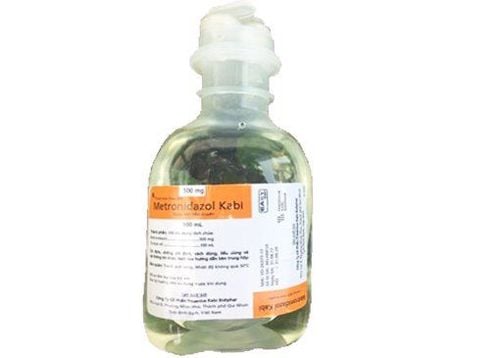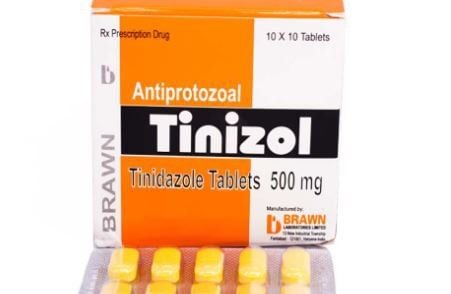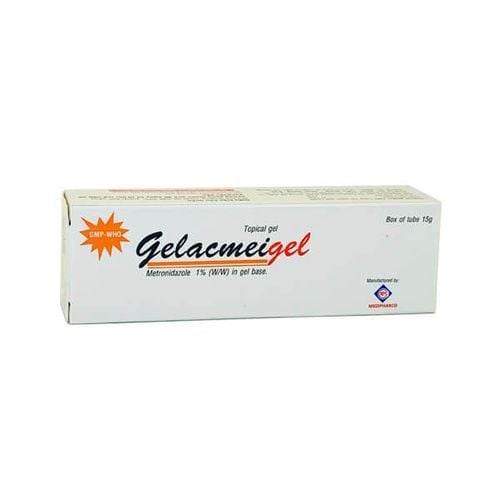This is an automatically translated article.
Phacodolin is an antibiotic, which is available in the form of an infusion or a tablet for oral administration. The drug is used in cases of anaerobic bacterial infections or to prevent infections for some high-risk subjects.
1. What is Phacodolin?
Phacodolin is a form of antibiotic prepared in the form of an infusion solution, with the main ingredient being Tinidazol 500 mg in each 100ml bottle or in the form of 500mg tablets. Tinidazole is an antibiotic belonging to the Tinidazole group. It is an alternative derivative of the imidazole compound with antiprotozoal activity and anaerobic antibacterial activity.
Effect of Tinidazole antibiotic:
Tinidazole is effective against anaerobic bacteria and protozoa because the drug penetrates microbial cells, then has a damaging effect on DNA chains or inhibits their synthesis. Tinidazole has therapeutic activity against both protozoa and obligate anaerobes. Antiprotozoal activity includes several species such as Trichomonas vaginalis, Entamoeba histolytica, Giardia lamblia. Tinidazole is active against most anaerobic bacteria including: Bacteroides fragilis, Bacteroides spp., Bacteroides melaninogenicus, Clostridium spp., Eubacterium spp., Fusobacterium spp., Peptococcus spp., Peptostreptococcus spp., Veillonella spp. Due to its effect on a wide range of bacteria and protozoa, it is used in many cases, especially for gastrointestinal infections.
2. Indications and contraindications of the drug Phacodolin
The drug is indicated for use in the following cases:
Prevention of postoperative infections caused by anaerobic bacteria, especially those after colon, gastrointestinal and gynecological surgery. Anaerobic infections such as peritonitis, abscess, gynecological infections such as endometritis, myositis, nonspecific vaginitis, uterine-ovarian abscess, sepsis. Skin and soft tissue infections. Infections of the upper and lower respiratory tract: Pneumonia, purulent inflammation of the pleura, lung abscess. Acute ulcerative gingivitis. Trichomoniasis of the genital tract and urinary tract in both men and women. Giardiasis. Intestinal amoebiasis, hepatic amoeba. The drug should not be used in the following cases:
Hypersensitivity to imidazole or other derivatives of the nitro imidazole group or any of its ingredients. Patient has Stevens-Johnson syndrome. History of hematologic disorders, organic neurological disorders. Women in the first 3 months of pregnancy and women who are breastfeeding.
3. Usage and dosage of Phacodolin
How to use the drug: The drug is prepared in the form of intravenous injection will be administered intravenously. The tablet form is to be taken with water during or after meals.
Dosage of the drug is as follows:
Intravenous infusion 400 ml of solution 2 mg/ml (equivalent to 800 mg tinidazole) at the rate of 10 ml/min. Continue the daily infusion of 800 mg/time or 400 mg/day, until the patient is able to take the drug.
Oral use depending on each case:
Prevention of infection after surgery: Adults take a single dose of 2g tinidazole 12 hours before surgery. Treatment of anaerobic infections: Adults take 2g on the first day, then take 1g once a day or take 500mg, twice a day. Patients are usually prescribed for 5 to 6 days of treatment and the duration of treatment depends on the clinical results; When thoroughly treating infections in some difficult locations, it is necessary to prolong the treatment for more than 7 days. In children under 12 years of age, there are insufficient data on the dose for the treatment of anaerobic infections in children under 12 years of age. Nonspecific vaginitis: 2g as a single dose, but success rates are higher if 2g is taken orally once daily for two consecutive days. Acute gingivitis: Take a single dose of 2g. Trichomoniasis of the urinary tract: Once an infection caused by Trichomonas vaginalis has been confirmed, the patient should be treated at the same time as the sexual partner. The regimen is for adults with a single dose of 2g. Children: A single dose of 50 to 75 mg/kg body weight is recommended. Sometimes it may be necessary to repeat the dose again. Giardia: Adults can take a single dose of 2g per day or a 150mg tablet twice daily for 7 days. Children: Take a single dose of 50 to 75 mg/kg body weight. Sometimes, your doctor may re-order this dose again. Enteric Amoeba: Adults take a single dose of 2g for 2 or 3 days or 600mg twice daily for 5 days. In some cases, when a single 3-day dose is not effective, treatment can be continued for up to 6 days. When twice-daily treatment for 5 days is ineffective, oral therapy can be continued for up to 10 days. Children can take a single dose of 50 to 60 mg/kg body weight per day for three consecutive days. Liver amoeba: Treatment may need to be combined with purulent aspiration. The initial oral dose is 1.5 to 2 g per day for 3 days as a single starting dose. If 3 days is not effective, oral therapy can be continued for up to 6 days. Another alternative is to take 600mg twice daily for 5 days. If five-day treatment has no effect, further treatment can be continued for up to 10 days. Children receive a single dose of 50 to 60 mg/kg body weight per day for 5 consecutive days. The above drug dosage can be used as a reference, you should take the drug exactly as directed by your doctor to achieve the best effect.
4. Side effects when taking the drug Phacodolin
Side effects can occur but are not frequent and are usually mild and self-limiting. Side effects include:
On the gastrointestinal tract: Nausea, vomiting, loss of appetite, diarrhea, abdominal pain and metallic taste in the tongue. Hypersensitivity reactions are rare but very serious, with symptoms such as difficulty breathing, angioedema, rash, etc. When seeing these signs, the patient needs to go to a medical facility immediately. Allergies can appear as skin rash, itching, urticaria. Neurological disorders associated with the use of Tinidazole include dizziness, lightheadedness, ataxia, peripheral neuropathy (paresthesia, sensory disturbances, hypoesthesia) and rarely have occurred. convulsions. Like similar drugs in this class, Tinidazole can cause transient leukopenia. Other rarer side effects reported were headache, fatigue, and dark urine. Patients should notify their doctor when they see side effects, especially serious side effects.
5. Note when using Phacodolin
Before taking the drug, you should note the following:
You should inform your doctor about your history of allergies, medications you are taking and other medical conditions if any. People with a previous history of blood or neurological disorders have a higher risk of experiencing this side effect. Therefore, if convulsions or peripheral neuropathy occur, the drug should be discontinued and the physician informed. This is an antibiotic that is only used when there is an anaerobic infection or a parasite that is sensitive to this antibiotic. You should not self-medicate or use the wrong dose to avoid antibiotic resistance. The drug is contraindicated in pregnant women in the first 3 months of pregnancy, because it can cross the placental barrier. The drug has no evidence of safety in the second and third trimesters of pregnancy, so it is not recommended to use it and only use it when the benefits outweigh the risks. Store the medicine in a cool, dry place, away from sunlight, out of reach of children. Do not use the medicine if there are signs of damage or expiry date. Phacodolin is used under the prescription of a doctor, you do not arbitrarily use it without being prescribed. Avoid drug resistance and side effects.
Follow Vinmec International General Hospital website to get more health, nutrition and beauty information to protect the health of yourself and your loved ones in your family.
Please dial HOTLINE for more information or register for an appointment HERE. Download MyVinmec app to make appointments faster and to manage your bookings easily.













